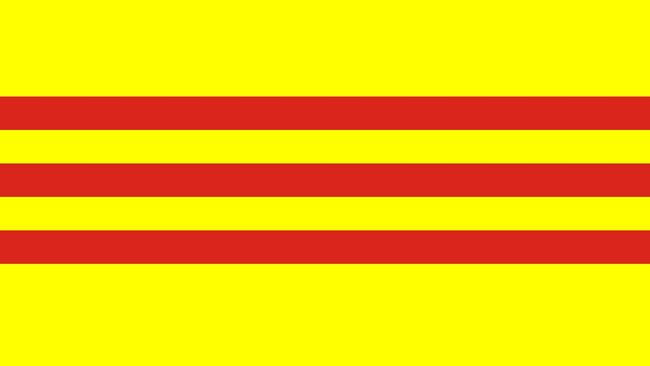City of Yarra puts out more flags for calendar of causes - and for a nation that doesn’t formally exist
The City of Yarra will fly 20 different flags at its three town halls in Richmond, Collingwood and Fitzroy. But residents say it’s a “circus”.
News
Don't miss out on the headlines from News. Followed categories will be added to My News.
The City of Yarra’s updated flags policy will raise the flag of a west African republic which does not formally exist and also devote 14 days to a range of LGBTQI causes.
The review by the Greens-leaning council means 20 different flags will be flown at its three town halls – Richmond, Collingwood and Fitzroy – as well as its Clifton Hill depot.

Each site will fly the Australian, Aboriginal and Torres Strait Island flags daily but have a separate flagpole for its range of issues.
The updated civic flags policy declares that:
AUSTRALIA’S national flag will be removed and the two Indigenous flags flown at half mast three times – on Australia Day, on April 15 (anniversary of the release of the report into Aboriginal deaths in custody) and on May 26 (Sorry Day).
THE Intersex Inclusive Pride Flag is flown on two separate dates, as will the Intersex Flag, to mark the Intersex Day of Remembrance.
THE flag of Sahrawi Arab Democratic Republic will still be hoisted up the flagpole every February 27, even though the western Sahara “nation” is not formally recognised.
THE aromantic flag, which sparked controversy in 2021 and honours people who feel no romantic attraction, will continue to fly for a whole week in February but will have to come down on one day to make way for the Sahrawi flag-raising.
The changes were passed in August, tucked away in a governance report with the details and changes separate to the main agenda. The report was carried unanimously.

No mention is made of flying flags at half mast for events such as Remembrance Day.
Residents said the policy was a “circus” and asked why Anzac Day and Remembrance Day was ignored.
Yarra Residents Collective spokesman Adam Promnitz said the council seemed to think it was the United Nations, rather than doing the basics for residents such as playgrounds, roads and rubbish services”.
“They spend more time tying themselves in knots over flags than delivering services to their residents and ratepayers,” Mr Promnitz said.
Council Watch spokesman Dean Hurlston said the council should have better priorities.
“The overuse of flags, like anything, simply becomes tokenism and people are fast getting over tokenism.
“At a time when all Victorians are struggling under the pressure of rates and cost of living, and Yarra renters are struggling too, this council has its priorities on flags … what next a flag committee? A flag advisory body? A flag consultant? People want councils to focus on local issues – not flag rotation.’’
The council policy said the flags symbolised and celebrated the community’s diversity and “shall be used for flying flags that have special meaning to all or part of Yarra’s community’’.
“In flying these flags, council celebrates Yarra’s rich history and formally acknowledges the flag flown as one of significance to the City of Yarra,’’ it said.

Most councils including the City of Melbourne follow state and federal government protocols on flying flags.
Darebin this year also flew the Transgender Flag on March 31, the International Day of Transgender Visibility, and the Rainbow Flag for the International Day Against Homophobia, Biphobia and Transphobia on May 17.
Merri-bek last month voted to fly the Palestinian flag to oppose Israel’s military action in Gaza.
Port Phillip Mayor Heather Cunsolo said its protocol allowed for the Australian flag to be temporarily displaced from St Kilda Town Hall for Rainbow Pride Flag in the week leading up to the Midsumma Pride March.
The Aboriginal flag is flown on National Sorry Day, for Reconciliation Week and NAIDOC Week. On these dates, the Australian flag is flown on one of the Town Hall’s front lawn flag poles.
The Yarra schedule also includes flying the flag of the International Campaign to Abolish Nuclear Weapons, or ICAN, on August 6, the anniversary of the bombing of Hiroshima in 1945.
ian.royall@news.com.au



